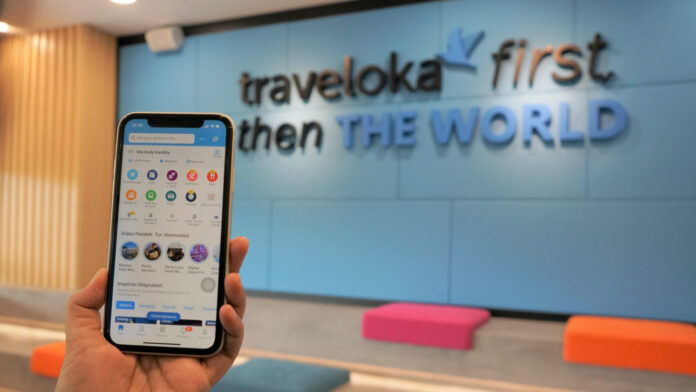Sudibyo M. Wiradji (The Jakarta Post)
Jakarta ●
Mon, July 11, 2022
Travel and tourism, the industry hit hardest by the coronavirus pandemic over more than two years, has started to bounce back amid the increasingly eased restrictions and people’s growing interest in traveling again, supported by digital technology.
The surge in tourist arrivals parallels the government’s policy of gradually easing curbs and reopening borders. Almost five times as many foreign tourists visited Indonesia in April compared to the same month last year, according to the Tourism and Creative Economy Ministry.
Shirley Lesmana, chief marketing officer of lifestyle superapp Traveloka, expressed her optimism about the positive trend in the tourism industry.
“Second-quarter growth in 2022 was solid. Rising demand for flight tickets and hotel bookings are no longer confined to staycations and road trips, but have expanded to interisland flights and even overseas destinations as more countries’ borders are [reopened],” Shirley told The Jakarta Post recently.
A leading lifestyle superapp in Southeast Asia that provides booking services beyond transportation and accommodation, Traveloka consistently offers products and services that aim to ease users’ experience in meeting their travel and lifestyle needs. The recent resurgence in the travel industry has reaffirmed the self-billed #LifeBuddy superapp to help customers see the world again.
Launched in 2012, the superapp was the first homegrown start-up to expand its products and services to Southeast Asian countries outside Indonesia. It now has a strong presence in Malaysia, Singapore, Philippines, Thailand and Vietnam.
According to Shirley, the COVID-19 pandemic that had confined most people to their homes had also spurred customers’ adoption of digital technology to meet their needs, including travel. “The interest in digital products is relatively high, which is good for the travel industry,” she said.
“We strive to make our products inclusive for our customers, not just for the digital native generation, but also for people who have just started or never adopted digital products. Hence, we consciously design our products with human-centric principles, where everything needs to be intuitive and seamless […] thus making the digital adoption process more seamless,” she said.
On its journey to provide end-to-end customer solutions, Traveloka has joined forces with tens of thousands of partners that provide travel and lifestyle services, such as land transportation, flights, hotels and attractions.
“As a lifestyle superapp, we can help customers by making the travel decision-making process far simpler with the help of digital applications,” said Shirley.
“Customers can purchase several travel products, lifestyle products, including insurance policies, [using] one application in just a couple of seconds. This means customers can save time and energy, as they don’t have to go to different agencies as they used to,” she said.
Traveloka made sure that customers received personalized recommendations powered by technology and data. The superapp also offered peace of mind, even when they decided to cancel their plans and wanted a refund. “We give our customers flexibility in options,” noted Shirley.
. (./.)
A technology company that is constantly evolving to stay relevant and offer innovative solutions, Traveloka has adopted a customer-centric marketing principle. One way it presents innovative solutions is to offer travel and lifestyle products and services via livestream to match the growing trend of watching interactive videos among customers.
“We also take advantage of social media networks. Currently, we have more than two million loyal active users across all of our social media channels. They can be a source of inspiration for our partners. The goal is an uplift in transactions or business [that] can help partners recover their business,” she underlined.
It is no surprise that Traveloka’s flagship promotional program, the Epic Sale, posts growth from year to year. Traveloka experienced a twofold increase in bookings during the Epic Sale this May, compared to the fourth-quarter event in 2021. The 2022 Epic Sale involved 55,000 partnering travel and lifestyle businesses.
The demand for airline tickets and hotels has increased, and not only for popular destinations such as Bali and Yogyakarta, but also from high-profile “super priority” destinations such as Lake Toba in North Sumatra and Labuan Bajo in Lombok.
“This is because domestic tourism has gradually recovered,” said Shirley.
Continuing she said that tourism involved many stakeholders and had a multiplier effect, “creating jobs in destinations tourists visit, as they need lodging, food and attractions”.
Traveloka has actively contributed to accelerated tourism recovery in Indonesia by providing symmetrical information to enhance customer confidence and by educating its partners on the CHSE (clean, health, safety and environment) principle through a variety of activities.
One of the roles the superapp fulfills is to provide connectivity among all tourism stakeholders, particularly between its partners and customers so both can enjoy the convenience of accessing a variety of products with just one app. This also helps sustain growth in the country’s tourism ecosystem.
Traveloka also nurtures and encourages its partners to grow together by providing access to tens of millions of users across Southeast Asia.
“This way, they make many improvements to enhance their quality, which complements each other. I think this will bode well for the future of our tourism industry,” Shirley said.
This article is published in collaboration with Traveloka.










